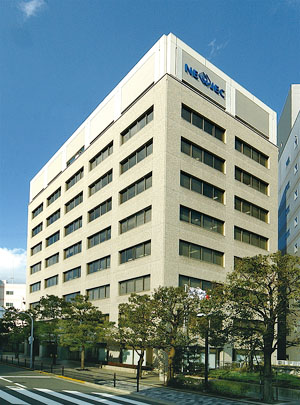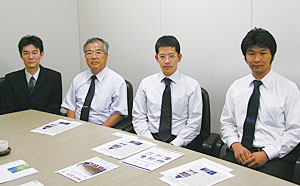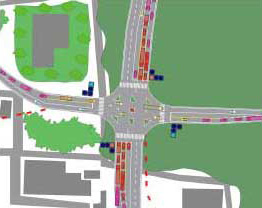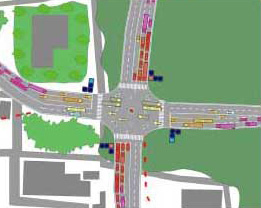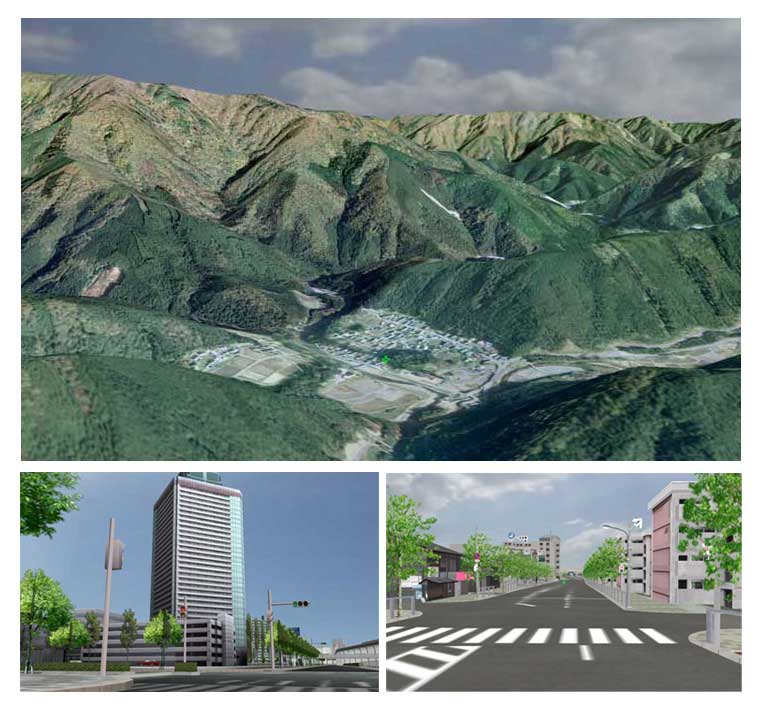With "Visualization" as a key word, NEWJEC utilizes 3D dynamic nonlinear analysis tool as well as technology of in-house
development such as traffic simulation and VR.
Having started in Kansai area on the basis of its accumulation of technology in the field of electric power projects, NEWJEC Inc. is spreading to the whole country as a general civil engineering consultant centering on the Head Offices in Osaka and Tokyo. Above all, we focus on Roads & Transport Group, which is placed in Domestic Operation Division of the company.
Roads & Transport Group has been using various design software products of Forum 8 that fit different processes of bridge projects from ground to superstructure work. Following the successful use of them, "UC-win/FRAME (3D)" was brought in lately. Mr. Kosei Kawamata, Group Manager, Roads & Transport Group; Mr. Satoshi Uchida, Team Leader, Bridges Team, Roads & Transport Group; Mr. Yoshitaka Akasaka, Bridges Team; and Mr. Hirokazu Katayama, Assistant Work Leader, Corporate Planning Group explain their views on actual use of this three dimensional analysis program for space-framed structures.
NEWJEC Inc. was founded in 1963 as the New Japan Engineering Consultants, Inc. Following the completion of the Fourth Kurobe River Power Station, the engineers who had supported the construction project took the lead in establishing the company. In 1991, it was renamed as NEWJEC, taken from the initials of the former company name.
In 1992, Tokyo Branch Office was raised to Tokyo Head Office. At present, NEWJEC has a nationwide network with Head Offices in Osaka and Tokyo, 10 Branch Offices, 33 offices, and 1 Laboratory, along with 580 employees (among them are 506 engineers as of May, 2006).
As a general civil consultant company, NEWJEC provides services for a wide range of fields, to say nothing of the power industry covered at its earliest stage. On the other hand, NEWJEC has been active not only in domestic areas but also in foreign countries to achieve good results in large projects as a main consultant.
In order to support these activities, NEWJEC is organized to have, under Top Management, Compliance Office, Corporate Planning Office, the General Administration Office, Domestic Operation, and International Operation. Domestic Operation division is further divided into groups of Electric Power Marketing, Proposal Examination, Technology Development, Global Environment, Rivers, Roads & Transport, Urban & Regional Development, Ports & Coastal Engineering, Geosphere, Power & Communication, and Architect. Each of these groups comprises several teams. For example, "Roads & Transport Group" is composed of Traffic System Planning Team; Roads, Highways, and Tunnels Team; and Bridges Team.
Traffic System Planning Team performs researches, analysis, planning, assessment, and public involvement (PI) of traffic and so on; Roads, Highways, and Tunnels Team conducts planning, design, construction management, and maintenance of roads and highways including various structures; Bridges Team carries out jobs such as researches, planning, design, analysis, and study of bridges as well as steel and concrete structures. According to Mr. Kawamata, the key duties, especially for "Roads & Transport Group," include application of traffic simulation and virtual reality (VR) using tools of in-house development, as well as various analysis of bridges or soft ground.
Bridges Team has been using Forum8 products that "cover from ground to structures on the land," says Mr. Akasaka. Especially for design software, Forum8 products account for most of the software products they have brought in depending on various processes and usages.
"In the case of other vendors' products, there are not a few limitations. For example, a drawing function may be limited to general drawings, or it may be necessary to purchase an additional tool that is more expensive."
In this sense, he felt easy to use Forum8 Products, for their Design Tool Lineup provides continuity from piles to foundation and piers, enabling to perform design through drawing successively.
They then started to use "UC-win/Frame (3D)" as an extension of the above. Focusing on analysis technology such as dynamic analysis and the finite element method (FEM), the Team was positive about handling a new tool or a model that was required. Mr. Uchida recalls that UC-win/FRAME (3D) was adopted after receiving a request from its client to make results of the analysis easier to understand.
After examining various software tools, they found out that UC-win/FRAME (3D) is able to perform diverse and advanced analysis, as well as to output the data as 3DS files or AVI files for animations. It means that it not only offers visualization of the results of dynamic analysis with ease, which is hard to be done by other tools, but also eliminates redundant works. They decided to try it out.
"Until recently, such a request couldn't have been conceived, I presume," says Mr. Uchida. Previously, for example, if it was the case that only judgments of "OK" and "NG" were to be shown using figures and tables, it passed as it was. However, as it is getting gradually recognized that technology such as modeling and animation realizes advanced visualization rather easily, the clients' needs have been changing to assume such functions.
"Now is the time when it is not enough to be able to perform an ordinary dynamic analysis; it can be said that something more is needed," Mr. Uchida continues.
UC-win/FRAME (3D) is compatible with many other software products for design and analysis that were introduced in the Group. In addition, for NEWJEC has developed an in-house VR system, it was noted that 3D data generated with UC-win/FRAME (3D) could be utilized by linking them to the VR system.
"To realize better relationship between nature and human beings," as NEWJEC holds up as its mission, "KUNJ-Sakura," a tool for microsimulation of traffic flow, and "NVR (Newjec Virtual Reality)," a 3D VR system, are positioned to be specific approaches to propose the best solution with advanced technology. Roads & Transport Group developed the former, and Technology Development Group developed the latter, both of which serve the purpose of preparing proposals as NEWJEC. They are making a great effort in extending their applications. First, KUNJ-Sakura is a tool to grasp, analyze, and examine various problems caused by traffic flows accurately and properly. It computes each vehicle's movement to represent its microscopic behavior, and totally simulate the traffic flow. Specifically, it reflects vehicle properties, road conditions, traffic light conditions, route selection of vehicles, lane selection of vehicles, factors to determine the behaviors of vehicles, and so on. It is also possible to customize it flexibly depending on the scenes of applications. Developed through joint study with Kyoto University (Dr. Iida's Laboratory), it has been applied in practical business since the end of the fiscal year of 2002.
On the other hand, NVR is a tool to support various scenes of communication occurring in each phase of providing infrastructures with 3D VR. It has realized the original concept of assisting design work, enabling presentation with a notebook computer at any place. It is assumed to have a wide range of application.
Besides, NEWJEC developed Urban Flood Damage Analysis Model and Urban Flood Damage Display System, which are expected to have new potential of application. The former is a tool to evaluate flood risk in urban areas that occur frequently in recent years, while the latter is a tool to visualize the results.
In addition, H-ADCP (Horizontal Type of Acoustic Doppler Current Profilers) Discharge Measurement System is a tool to observe river discharge or riverbed conditions with ultrasonic waves in managing rivers and dams, developed by NEWJEC in cooperation with the Kansai Electric Power Co., Ltd. By clearing restrictions of accuracy, this tool is expected not only to reveal the structure of river flow, but also support disaster prevention or environmental mitigation measures.
The business fields that attract NEWJEC towards its future development include PFI (Private Finance Initiative) projects, PI, PM (Project Management), and CM (Construction Management).
Also, in aiming at differentiation from other firms, Roads & Transport Group places emphasis on its own proposal activity by way of in-house developed technology such as the above KUNJ-Sakura and NVR, as well as on advanced analysis conducted with tools like "UC-win/FRAME (3D)." Along with these activities, the Group is also coping with technology development positively so as to open up a new possibility in asset management and the like.
Above all, Mr. Kawamata recognizes that it is a key concept "to make things easier to understand visually."
For example, in trying to present evaluation of seismic resistivity, especially at a public meeting, it is expected to be more effective to present the shaking of earthquake in animation rather than by simply displaying the raw data of the calculated results, to gain the understanding of the residents. Also, if it is possible to simulate why and how failures occur in structures, as well as the mechanism of effects and damages caused by natural disasters including landslides and tidal waves (tsunami), these tools will function more effectively, as Mr. Kawamata says.
On the other hand, as NEWJEC is a user of Forum8's "UC-win/Road," a multipurpose 3D real-time VR, it is considered that use of "UC-win Road" together with KUNJ-Sakura and NVR of their own development will lead to more effective use of resources.
"It is the best way to represent the image as close as possible to the reality, in other words, to represent it visually including its motions in order for everyone to equally understand it," says Mr. Kawamata, inferring that it is getting more and more essential in the Group's priorities including traffic simulation, VR, and analysis to respond to such needs.
We would like to thank NEWJEC staff for their time and detailed answers to our interview.
